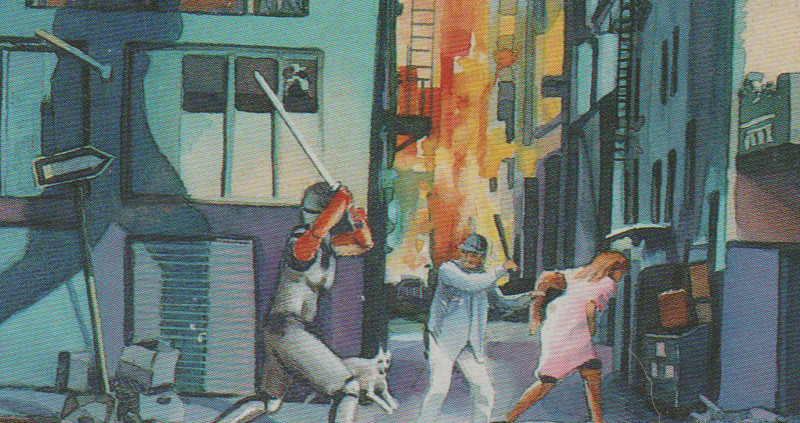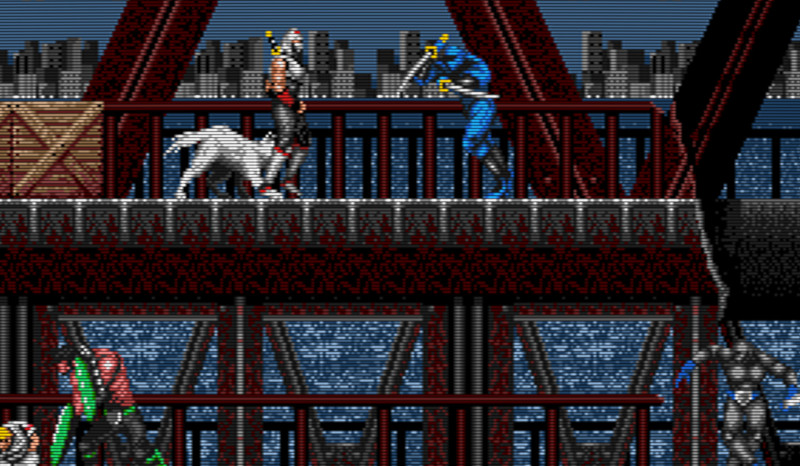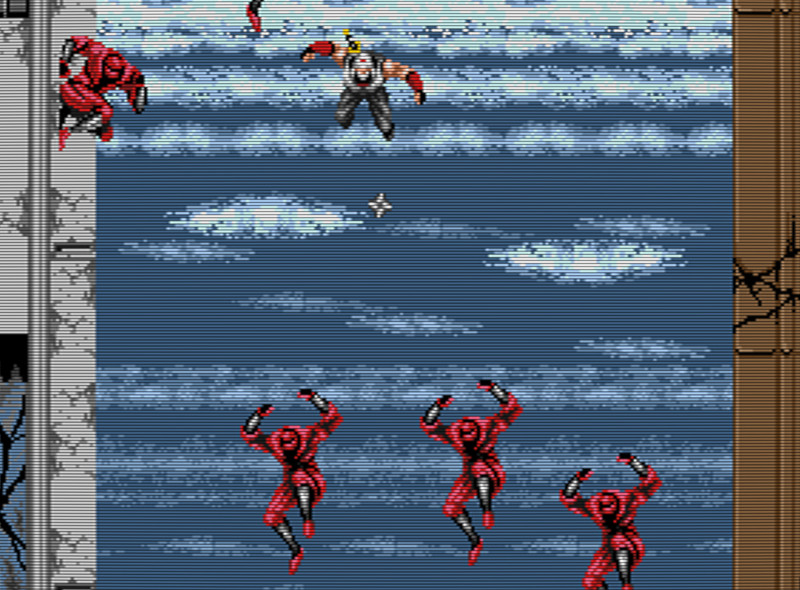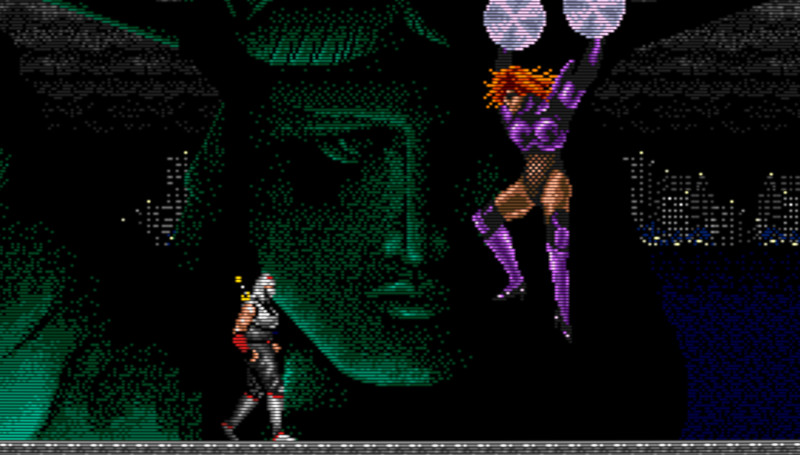
Shinobi and the arcade version of Shadow Dancer both play very much alike. Your ninja moves and jumps at a fast clip in both games, while the shurikens he fires move slowly across the screen. The jump here needs to be emphasized: it's a slight, quick hop and ample enough to clear obstacles cleanly without wasting any time. You're just up and over whatever is in your way and you keep moving on. It feels great. The sprites are large so the combat is relatively close quarters most of the time, so the slow shuriken speed ensures that you're not obliterating your enemies immediately before they have a chance to attack. The MD Shadow Dancer, a completely new game (though I hesitate to call it a sequel), kind of reverses all of this. The playfield is more zoomed out, and accordingly our ninja moves slower but has faster moving shurikens. Most importantly though, the jump is now much floatier; you hang in the air for what feels like a full second. As a result the control feels much looser and sloppier than its arcade cousins, and is on the whole less satisfying.
Another way in which the game slows down is the bonus stages between each mission. The arcade bonus games are short, challenging tests of accuracy pitting you against a gallery of ninjas in a first person perspective that are quite fun in their own right, and even if these diversions aren't your bag, you can fail them instantly by just not doing anything and letting a ninja attack you, thus moving you on to the next stage of the real game. MD Shadow Dancer on the other hand has you falling from a building in the same perspective as the main stages, shooting enemy ninjas that do nothing but bounce upwards between the buildings. They don't attack and the stage continues if you miss any number of them, which means you're in for the full minute or so of falling no matter what. It's a very uninteresting bonus game to begin with, but it being unskippable completely kills the pace. What's worse is that it's extremely easily cheesable; just hug the left building and fire regularly and you'll get all the ninjas every time, which gives you 3 extra lives. Take the pacifist route and kill no ninjas for a 1up.


Speaking of which, this game gives you way too many lives, but to be fair that's more or less expected for a console game. You get 5 lives to begin with and you kind of have to go out of your way to avoid getting more, which makes for a very wide gulf in difficulty between the 1CC and the no death clear. Not a huge deal, but worth mentioning. Worthy of praise, however, are the difficulty levels. Like Shinobi, each difficulty level gives you a distinct enemy layout for each stage. Level 1, 2, and 3 of MD Shadow Dancer roughly corresponds to Shinobi's Easy, Normal and Hard difficulties. Abundance of lives aside, the game pulls no punches in terms of level design; some of the setups on difficulty level 3's later stages are every bit as devious as the arcades'.
In the arcade Shadow Dancer you would crouch and press the fire button to tell command your dog to attack the nearest target. For whatever reason in MD Shadow Dancer you now charge up a meter by holding down the fire button, and when fully charged you release it to make your dog attack. You can't do this without firing a shuriken, so getting the special bonus for only using melee attacks can make using your dog difficult (but not impossible; the game only invalidates the special bonus if a shuriken connects with an enemy, not if you fire one at all). That is, if you're not using the special No Shuriken mode, which makes the melee attack your only attack. This mode means that you don't have to be in any particular range of an enemy to use your sword, but the sword's range is greater than the melee activation range in the normal Shuriken mode, so this makes certain encounters with, for example, shield guys and ninjas, a bit easier than they would be outside of No Shuriken mode because there's no danger of firing a useless shuriken that would just be blocked, though encounters with gun wielding thugs become far more dangerous.

Aesthetically the game doesn't fall too far from the standard set by its arcade counterpart, though it's marred slightly by a dark, muddy color palette typical of many Mega Drive games. The first four missions are distinct and interesting, putting you in diverse locales ranging from a burning city to the statue of liberty. The music, while nothing too special, evokes nicely the feeling of an 80's crime action show. Unfortunately, MD Shadow Dancer falls spectacularly flat in its home stretch; the final mission consists of five bland rooms set in a dark uninteresting warehouse full of beige crates, each room having an arrangement of one type of enemy (one room has all gun guys, one room has all ninjas, etc.). This is about as lazy as it gets in terms of both level design and aesthetics, and it's a stark contrast to the game that up to that point stood competently with its arcade predecessors. It meets the requirement of being harder than what came before, sure -- on the hardest difficulty this stage gets downright evil, especially in No Shuriken mode -- but there's nothing to keep you here once the going gets too tough. There's no motivation to keep going if all you see is boxes in a dark room. I've spoiled too much here already but suffice it to say the final boss fares no better. You get the impression that they ran out of time here and had to slap something together, which is a real shame.
So when it's all said and done we have here a game that plays differently than the game it's based on in terms of basic control and mechanics, but feels quite the same in terms of level design. Take down the number of starting lives and delete the interminable bonus stages altogether and you'd have a game that could slot right into an arcade machine no questions asked. I said I didn't want to call it a sequel to arcade Shadow Dancer because it doesn't really build on it at all. It's more of a side story, one with a very disappointing ending at that. If I'm right and the team had just a little more time to give the game the finale it deserved, then I could call it a worthy bearer of the Shadow Dancer title, but as it is I can only call it mediocre.
Final rating: 3/5 (Average)